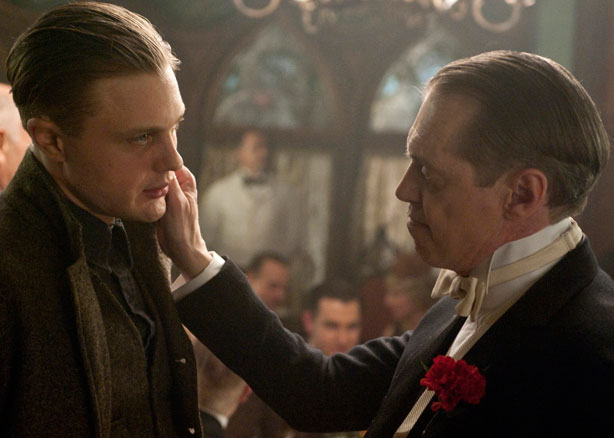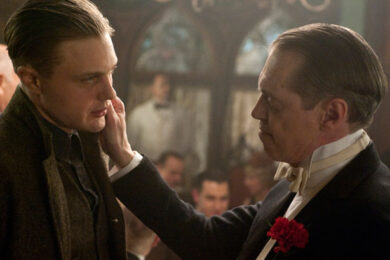Following a handful of independent prototypes, the first version of what we recognise today as Monopoly was launched by toy makers Parker Brothers in 1935, comprised of familiar landmarks and locales in Atlantic City, New Jersey. Boardwalk Empire, the Martin Scorsese-produced period gangster drama premiering in the UK on 1 February, is set in the same city 15 years earlier, and the parallels are striking.
In both, the protagonists play a strategic game of power, control, money, greed and territory. But while the worst that can happen in the former is bankruptcy or landing on the ‘Go To Jail’ square, the latter’s losers can wind up full of bullet holes or strung up outside a funeral parlour disguising a whisky bootlegging operation.
The laziest media shorthand that greeted the arrival of Boardwalk Empire in America last autumn described it as a Prohibition-era Sopranos, but dig a little deeper than its mob ties and shared geography and you’ll find a complex drama that arguably pays as much attention to factual historical detail as Scorsese’s 2002 cinema offering Gangs Of New York. When the US Congress outlawed the sale, manufacture and transportation of alcohol, it opened the floodgates to every stripe of opportunist willing to give the public what they wanted.
One such opportunist was Enoch Lewis ‘Nucky’ Johnson, a Republican party high-flier who used his government position in Atlantic City to determine who should adhere to the booze ban and who should be allowed to continue without having their collars felt, so long as he received a sizeable kick-back to top up the estimated half a million dollars a year he was already raking in from underworld gambling and prostitution. However, as portrayed on screen by Steve Buscemi (with the surname changed to Thompson), Nucky is – initially at least – a man with a moral code.
As county treasurer (the region’s most powerful official), he’s a much-loved philanthropic figure, a hero to the downtrodden and impoverished, if not entirely squeaky clean. The introduction of Prohibition changes that – not least because bootleggers and racketeers from neighbouring New York, and further afield from Chicago, set their sights on Atlantic City and its reputation as an adult playground as a tempting, untapped source of income. The big boys are moving in to his back yard, and, as one of his subordinates tells him early in the series, “You can’t be half a gangster, Nucky, not any more”.
Buscemi is terrific in the drama’s pivotal role, delivering a mannered and layered performance completely distanced from the weaselly characters for which he’s previously been most celebrated (Reservoir Dogs, Fargo, The Sopranos, 30 Rock). Nucky is a complicated man, his ruthless streak and criminal tendencies tempered by the sorrow he still feels after his wife’s death seven years earlier, and a desire to be a father figure to those around him.
Chief among these, as the series begins, is his protege Jimmy Darmody (Michael Pitt): a deep thinker who dropped out of college to fight in the First World War but who, now back home with a young family to support, finds other and less capable men leap-frogging ahead of him in Nucky’s hierarchy. After hatching a plan with a counterpart underling from Chicago, a young Al Capone, he sets out to prove his worth to Nucky, but with tragic consequences.
British actress Kelly Macdonald shines as the domestically abused and heavily pregnant Margaret Schroeder, a well-read Irish immigrant who turns to Nucky for help in finding her husband a job but is herself taken under the wing of the kindly, contradictory kingpin. Seeds are sown in the early episodes of the series to suggest she will increasingly emerge as Nucky’s unwitting – and perhaps unwanted – conscience, a reminder of who he once was before his hand was forced by the spiralling decadance of the times.
The wealth of supporting players adds to the rich texture of the drama, including another Brit, Stephen Graham, as Capone (a radical change of tack from playing footballer Billy Bremner in The Damned United), Michael Kenneth Williams as the leader of Atlantic City’s black underworld (arguably a 1920s zoot-suited version of his Omar from The Wire) and Michael Shannon as an ultra-religious federal agent tasked with shutting down the bootleggers.
Scorsese’s involvement has clearly helped boost Boardwalk Empire‘s profile, although beyond his listing as a main producer of the series, he’s in the director’s chair for just the pilot. Much of the creative team are Sopranos alumni (hence the shorthand mentioned earlier), with writer Terence Winter taking on the role of what the US industry calls a “show runner” in tandem with Scorsese. The pair jointly make all major casting decisions, sit in on script conferences, and, perhaps most importantly, have established the “look” of the programme; its rich photographic hues evoking a time in history when Atlantic City paraded its glamour and opulence to visitors while hiding its unsavoury heart.
The notion of “quality” television is almost a given today, in the wake of The Sopranos, The Wire, The West Wing and Mad Men. A certain strata of viewer practically demands brilliance every time they tune in, or (as some will frustratingly have to wait) shell out for a DVD box set. Boardwalk Empire delivers an intoxicating first case, and shows every sign of maturing even further.
Boardwalk Empire premiers on Sky Atlantic on 1 February, continuing the following evening. The channel is available free to all Sky subscribers, although an upgrade is required for high definition broadcasts.



